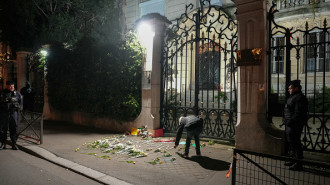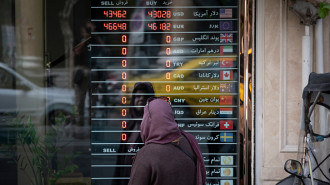Russian strike on Ukraine shopping centre kills at least 18, G7 decries 'war crime'
A Russian missile strike on a crowded mall in central Ukraine killed at least 18 people in what Group of Seven leaders branded "a war crime" at a meeting in Germany where they looked to step up sanctions on Moscow.
The leaders vowed that Russian President Vladimir Putin and those responsible would be held to account for Monday's strike in the city of Kremenchuk, carried out during the shopping mall's busiest hours.
"Indiscriminate attacks on innocent civilians constitute a war crime," they said in a statement condemning the "abominable attack".
Russian missiles just hit a crowded shopping center in Kremenchuk, while over a 1,000 civilians were inside. The possible number of casualties is unimaginable pic.twitter.com/H0QiWzwefq
— Anastasiia Lapatina (@lapatina_) June 27, 2022
Ukraine accused Russia of deliberately targeting civilians, with President Volodymyr Zelensky calling it "one of the most brazen terrorist acts in European history" in his evening broadcast posted on Telegram.
"A peaceful town, an ordinary shopping centre - women, children ordinary civilians inside," said Zelensky, who earlier shared a video of the mall engulfed in flames with dozens of rescuers and a fire truck outside.
Dmytro Lunin, governor of the Poltava region where Kremenchuk is located, said Tuesday that 18 people were killed in the attack.
Fifty-nine were wounded, according to emergency services chief Sergiy Kruk.
"All response groups are working in intense mode," Kruk said. "The work will go on around the clock".
In a separate attack Monday, Russian rockets killed at least eight civilians as they were out collecting water in the eastern city of Lysychansk, said Lugansk region governor Sergiy Gaiday.
Lysychansk has become the focus of heavy Russian attacks following the fall of its twin city, Severodonetsk.
"Our defenders are holding the line, but the Russians are turning the city into rubble, the infrastructure is completely destroyed," Gaiday said on Telegram.
After failing to capture Kyiv following their February invasion, Russian troops have focused on seizing a swathe of eastern Ukraine, and have been gaining ground.
A strike in Kharkiv, in Ukraine's northeast, killed four people and wounded 19 others, including four children, authorities said.
British Prime Minister Boris Johnson, speaking from the G7 gathering in the Bavarian Alps, said the Kremenchuk attack demonstrated Putin's "depths of cruelty and barbarism".
US Secretary of State Antony Blinken said the world was "horrified", while UN chief Antonio Guterres's office condemned the strike as "totally deplorable".
French President Emmanuel Macron denounced the attack as an "abomination".
Diplomats said Ukraine requested a Tuesday meeting on the strikes at the UN Security Council, where Russia wields veto power but has not been able to prevent critical discussion of the invasion.
US President Joe Biden and his peers from the wealthy Group of Seven nations are seeking to tighten the economic screws on Moscow, even as soaring energy and food prices drive up global inflation.
"We will continue to provide financial, humanitarian, military and diplomatic support and stand with Ukraine for as long as it takes," the G7 said in a statement on the summit's second day.
Zelensky, addressing the leaders virtually, had urged them to "intensify sanctions" to help end the war before the bitter winter.
"We will continue to increase pressure on Putin," summit host German Chancellor Olaf Scholz said in response. "This war has to come to an end".
G7 leaders are discussing a price cap on Russian oil imports and sanctions targeting Russia's defence sector.
But European officials fear difficulty in implementation.
To help bring down surging prices, France urged oil-producing nations to raise output in an "exceptional manner" and Macron backed a return to the market of crude from Iran and Venezuela, both under US sanctions.
On Sunday, the G7 announced plans to stop imports of Russian gold.
Washington plans to send Ukraine sophisticated anti-aircraft missiles, National Security Advisor Jake Sullivan told reporters, meeting a long-standing request from Zelensky.
The summit of the G7 - which comprises Britain, Canada, France, Germany, Italy, Japan and the United States - ends Tuesday and will be immediately followed by a NATO meeting in Spain.
Ukraine is again expected to dominate the agenda.
NATO said Monday it would boost its high-readiness force from 40,000 to 300,000 troops and send more heavy weaponry to its eastern flank, in what chief Jens Stoltenberg called "the biggest overhaul of our collective defence and deterrence since the Cold War".
Lithuania, a NATO member at the forefront of pressuring Russia, announced it had been targeted Monday by a massive cyberattack.
The Russian hackers' group Killnet claimed responsibility, saying it was acting in retaliation for restrictions imposed by Lithuania earlier in June.
Russia last week threatened reprisals against the Baltic state for having banned the rail transit of certain goods to the Russian outpost of Kaliningrad. Vilnius said it was simply applying European Union sanctions.
Sweeping Western sanctions designed to choke off Moscow's access to the international financial system have pushed Russia closer to its first foreign debt default in a century.
Russia said Monday that two of its debt payments had been prevented from reaching creditors after a key deadline expired.
But "there are no grounds to call this situation a default", Kremlin spokesman Dmitry Peskov said.



